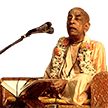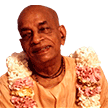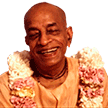Eternal Existence - an essential subject: Difference between revisions
(Created page with "Category:Essential Subjects <!----------------------- edit below this line -----------------------> <!------------------------ begin introduction text --------------------...") |
(Vanibot #0041: Moves Choose Another box to the end) |
||
| Line 2: | Line 2: | ||
<!----------------------- edit below this line -----------------------> | <!----------------------- edit below this line -----------------------> | ||
<!------------------------ begin introduction text ------------------------> | <!------------------------ begin introduction text ------------------------> | ||
Eternal existence is a quality of the Supreme Personality of Godhead, Kṛṣṇa. The Lord is eternally existent in His transcendental form, which is neither gross nor subtle like that of the embodied soul. As part of Kṛṣṇa, time, material nature and each individual soul also exist eternally. However, Kṛṣṇa is the only independent eternal being while everything else depends on Him. | |||
Srila Prabhupada's books, lectures, conversations and letters offer a comprehensive presentation of this essential subject as seen in the Vaniquotes '''[[Vaniquotes:Category:Eternal Existence|Eternal Existence]]''' category. An introduction from his books is given below in the following | The external energy of the Lord covers up the pure knowledge of the living entities eternally existing with Him, but the covering is so constant that it appears that the conditioned soul is eternally ignorant. These three modes of material nature, being further manifested as matter, knowledge and activities, put the eternally transcendental living entity under conditions of cause and effect and make him responsible for such activities. | ||
Srila Prabhupada's books, lectures, conversations and letters offer a comprehensive presentation of this essential subject as seen in the Vaniquotes '''[[Vaniquotes:Category:Eternal Existence|Eternal Existence]]''' category. An introduction from his books is given below in the following 13 quotes. | |||
<!-------- end introduction text and don't touch next three lines ---------> | <!-------- end introduction text and don't touch next three lines ---------> | ||
---- | ---- | ||
== Quotes from Srila Prabhupada's books == | == Quotes from Srila Prabhupada's books == | ||
<!----------------- edit quote boxes below this line -----------------> | <!----------------- edit quote boxes below this line -----------------> | ||
{{VaniQuotebox| | {{VaniQuotebox|A living being's sustenance of existence is to coordinate his activities with his eternal relation with the Supreme Lord Krsna|Kṛṣṇa is the central pivot of living beings, and He is the all-attractive living entity or eternal form amongst all other living beings or eternal forms. Each and every living being has his eternal form in the spiritual existence, and Kṛṣṇa is the eternal attraction for all of them. Kṛṣṇa is the complete whole, and everything else is His part and parcel. The relation is one of the servant and the served. '''(Śrīmad-Bhāgavatam 1.2.6)'''}} | ||
{{VaniQuotebox|The living entity exists eternally and has no past, present, or future tenses|One who thinks that he can destroy the living spark also does not know anything about it. The Personality of Godhead, Śrī Kṛṣṇa, therefore emphatically declares that the living entity, being spirit, is never born. The living entity exists eternally and has no past, present, or future tenses. The spirit is never annihilated, nor can anyone annihilate him, even after the annihilation of the material body. '''(Message of Godhead, Chapter 1)'''}} | |||
{{VaniQuotebox|The conditioned souls, although eternally existing as parts of the Supreme Lord, are sometimes put within the cloud of the material concept of life, in the darkness of ignorance. The whole Vedic process is to alleviate that darkened condition|Just as the sun rays are sometimes covered by a cloud, which is created by the sun, so the conditioned souls, although eternally existing as parts of the Supreme Lord, are sometimes put within the cloud of the material concept of life, in the darkness of ignorance. The whole Vedic process is to alleviate that darkened condition. '''(Kṛṣṇa Book, Chapter 87)'''}} | |||
{{VaniQuotebox|The Lord is eternally existent in His transcendental form, which is neither gross nor subtle like that of the living being|The Lord is eternally existent in His transcendental form, which is neither gross nor subtle like that of the living being; His body is never to be compared to the gross and subtle bodies of the living being. '''(Śrīmad-Bhāgavatam 1.3.32)'''}} | |||
{{VaniQuotebox|The Supreme Personality of Godhead is the creator of everything, and although the living entities are not created but exist with the Lord eternally, their bodies are created, whereas the Supreme Lord's body is never created|The Supreme Personality of Godhead is the creator of everything, and although the living entities are not created but exist with the Lord eternally, their bodies are created, whereas the Supreme Lord's body is never created. There is no difference between the Supreme Lord and His body, but the conditioned soul, although eternal, is different from his body. '''(Śrīmad-Bhāgavatam 8.1.3)'''}} | |||
{{VaniQuotebox|Time is compared here to a big wheel which has 360 joints, six rims in the shape of seasons, and numberless leaves in the shape of moments. It rotates on the eternal existence, Brahman|The time factor, however, cannot touch the lifespan of the devotees. In another verse it is stated that when the sun rises and sets it takes away the life of all living entities, but it cannot take away the life of those who are engaged in devotional service. Time is compared here to a big wheel which has 360 joints, six rims in the shape of seasons, and numberless leaves in the shape of moments. It rotates on the eternal existence, Brahman. '''(Śrīmad-Bhāgavatam 3.21.18)'''}} | |||
{{VaniQuotebox|Vani means words, and vapuh means physical presence. Physical presence is sometimes appreciable and sometimes not, but vani continues to exist eternally|Vāṇī means words, and vapuḥ means physical presence. Physical presence is sometimes appreciable and sometimes not, but vāṇī continues to exist eternally. Therefore we must take advantage of the vāṇī, not the physical presence. The Bhagavad-gītā, for example, is the vāṇī of Lord Kṛṣṇa. Although Kṛṣṇa was personally present five thousand years ago and is no longer physically present from the materialistic point of view, the Bhagavad-gītā continues. '''(Caitanya-caritāmṛta, Concluding words)'''}} | |||
{{VaniQuotebox| | {{VaniQuotebox|When transcendental devotional service, by which love for Krsna is attained, is executed by the senses, it is called sadhana-bhakti, or the regulative discharge of devotional service. Such devotion eternally exists within the heart of every living entity|When transcendental devotional service, by which love for Kṛṣṇa is attained, is executed by the senses, it is called sādhana-bhakti, or the regulative discharge of devotional service. Such devotion eternally exists within the heart of every living entity. The awakening of this eternal devotion is the potentiality of devotional service in practice. '''(Caitanya-caritāmṛta, Madhya-līlā 22.105)'''}} | ||
{{VaniQuotebox| | {{VaniQuotebox|Bhakti-rasa, however, the mellow relished in the transcendental loving service of the Lord, does not finish with the end of life. It continues perpetually and is therefore called amrta, that which does not die but exists eternally|Bhakti-rasa, however, the mellow relished in the transcendental loving service of the Lord, does not finish with the end of life. It continues perpetually and is therefore called amṛta, that which does not die but exists eternally. This is confirmed in all Vedic literatures. Bhagavad-gītā says that a little advancement in bhakti-rasa can save the devotee from the greatest danger—that of missing the opportunity for human life. '''(Nectar of Devotion, Preface)'''}} | ||
{{VaniQuotebox| | {{VaniQuotebox|Brahman is indestructible and eternally existing, and its constitution is not changed at any time. But beyond Brahman there is Para-brahman. Brahman refers to the living entity, and Para-brahman refers to the Supreme Personality of Godhead|Brahman is indestructible and eternally existing, and its constitution is not changed at any time. But beyond Brahman there is Para-brahman. Brahman refers to the living entity, and Para-brahman refers to the Supreme Personality of Godhead. '''(Bhagavad-gītā 8.3)'''}} | ||
{{VaniQuotebox| | {{VaniQuotebox|This Vaikuntha planet (created by God), like Srimad-Bhagavatam, appears and is said to be born or created, but both Srimad-Bhagavatam and Vaikuntha eternally exist beyond the material universes, which are enveloped by eight kinds of coverings|Śrīla Viśvanātha Cakravartī Ṭhākura remarks here that this Vaikuṇṭha planet, like Śrīmad-Bhāgavatam, appears and is said to be born or created, but both Śrīmad-Bhāgavatam and Vaikuṇṭha eternally exist beyond the material universes, which are enveloped by eight kinds of coverings. '''(Śrīmad-Bhāgavatam 8.5.5 )'''}} | ||
{{VaniQuotebox| | {{VaniQuotebox|Only in ignorance does a living entity think that he is lost. If by attainment of knowledge he comes to the real position of his eternal existence, he knows that he is not lost|Only in ignorance does a living entity think that he is lost. If by attainment of knowledge he comes to the real position of his eternal existence, he knows that he is not lost. '''(Śrīmad-Bhāgavatam 3.27.15)'''}} | ||
{{VaniQuotebox| | {{VaniQuotebox|Love of God is eternally existing within everyone; it simply has to be evoked by the process of hearing. Hearing and chanting are the principal methods of devotional service|Love of God is eternally existing within everyone; it simply has to be evoked by the process of hearing. Hearing and chanting are the principal methods of devotional service. '''(Teachings of Lord Caitanya, Chapter 1)'''}} | ||
<!----------------- edit quote boxes above this line -----------------> | <!----------------- edit quote boxes above this line -----------------> | ||
''' | '''Eternal Existence - [[Vaniquotes:Category:Eternal Existence|explore more within this category]]'''. | ||
{{EsentialSubjectTotal}} | |||
<div style="float:left;"> | |||
{{EssentialSubjectnav}} | |||
</div> | |||
__NOTOC__ | __NOTOC__ | ||
__NOEDITSECTION__ | __NOEDITSECTION__ | ||
Latest revision as of 16:19, 22 November 2020
Eternal existence is a quality of the Supreme Personality of Godhead, Kṛṣṇa. The Lord is eternally existent in His transcendental form, which is neither gross nor subtle like that of the embodied soul. As part of Kṛṣṇa, time, material nature and each individual soul also exist eternally. However, Kṛṣṇa is the only independent eternal being while everything else depends on Him.
The external energy of the Lord covers up the pure knowledge of the living entities eternally existing with Him, but the covering is so constant that it appears that the conditioned soul is eternally ignorant. These three modes of material nature, being further manifested as matter, knowledge and activities, put the eternally transcendental living entity under conditions of cause and effect and make him responsible for such activities.
Srila Prabhupada's books, lectures, conversations and letters offer a comprehensive presentation of this essential subject as seen in the Vaniquotes Eternal Existence category. An introduction from his books is given below in the following 13 quotes.
Quotes from Srila Prabhupada's books
Eternal Existence - explore more within this category.
Vanipedia has now over 903 introductory articles compiled from Srila Prabhupada's books under the series titled Essential Subjects. All these articles can be seen in the Table of Content on the right side of this article and also here in this Umbrella Category. Browse through them to relish the breadth and depth of Srila Prabhupada's teachings - There is a subject for everyone.












